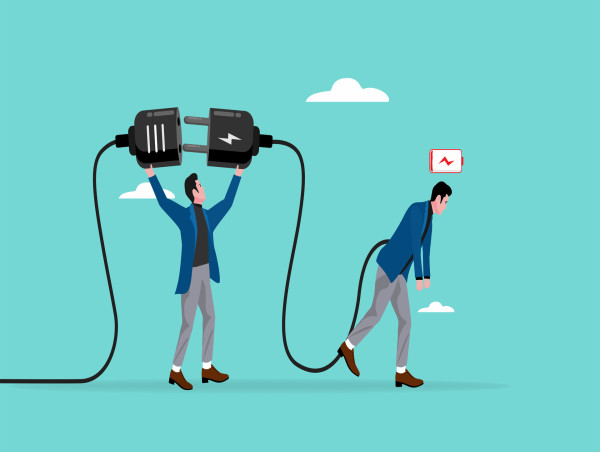Chris Rue, a board-certified Family Nurse Practitioner and founder of MOPE Clinic in Metairie, Louisiana, explains that hormones are responsible for regulating many key functions in the body, including energy production, metabolism, and mood. "Hormones play a central role in maintaining balance in the body. When these hormones are out of sync, it can lead to noticeable shifts in energy levels and mood, which can affect a person's quality of life," Rue says.
The Role of Hormones in Energy Levels
Hormones such as thyroid hormones, cortisol, estrogen, and testosterone have a direct influence on energy levels. When these hormones fluctuate, the body can experience a range of symptoms, including chronic fatigue, sleep disturbances, and difficulty concentrating. For many individuals, these symptoms are most noticeable when hormone levels are too low or too high.
For example, an imbalance in thyroid hormones, which regulate metabolism, can lead to feelings of sluggishness or fatigue. A condition such as hypothyroidism, where the thyroid is underactive, can cause a decrease in energy production, leaving individuals feeling constantly tired or drained. On the other hand, hyperthyroidism, where the thyroid is overactive, can lead to increased energy levels, but this may be accompanied by feelings of restlessness or difficulty sleeping.
Cortisol, often referred to as the "stress hormone," is another critical hormone that influences energy levels. In response to stress, the adrenal glands release cortisol, which helps the body manage stress and maintain energy. However, chronic stress can lead to cortisol imbalances, resulting in exhaustion or feelings of burnout. Over time, this can disrupt sleep patterns and further reduce energy levels.
Rue emphasizes the importance of balancing these hormones to maintain consistent energy. "When cortisol is elevated for extended periods, it can wear the body down, leading to fatigue and exhaustion. Conversely, an insufficient amount of cortisol can leave the body unable to respond effectively to stressors, further contributing to low energy."
Hormones and Mood Regulation
In addition to their effects on energy, hormones also play a significant role in regulating mood. Estrogen and testosterone, which are primary sex hormones, are crucial for emotional stability. Fluctuations in these hormones can lead to mood swings, irritability, and even feelings of anxiety or depression.
For women, hormonal changes during menopause, pregnancy, or menstruation can lead to emotional disturbances. A drop in estrogen levels during menopause is often associated with mood swings, irritability, and feelings of sadness or depression. Similarly, premenstrual syndrome (PMS) and premenstrual dysphoric disorder (PMDD) can be triggered by hormonal fluctuations that impact mood, energy, and overall well-being.
Testosterone, which is primarily considered a male hormone, also plays a role in mood regulation. Low testosterone levels can contribute to feelings of sadness, depression, and a lack of motivation. In both men and women, the decline in testosterone levels as they age can lead to changes in mood, energy, and libido.
Rue explains that addressing hormonal imbalances can help alleviate mood disturbances. "When hormone levels are restored to balance, many patients report feeling less irritable, more focused, and more emotionally stable," Rue states. "Hormonal therapy or other treatments may be recommended to help regulate levels and improve overall mood."
Common Symptoms of Hormonal Imbalance
Hormonal imbalances manifest in various ways, and symptoms can differ from person to person. Common signs of hormonal imbalance affecting energy and mood include:
Fatigue or low energy: Persistent tiredness or difficulty staying awake during the day, often despite adequate sleep.
Mood swings: Sudden changes in mood, including feelings of irritability, sadness, or anxiety.
Sleep disturbances: Trouble falling asleep, staying asleep, or experiencing restful sleep.
Difficulty concentrating: Brain fog, forgetfulness, or trouble focusing.
Changes in appetite: Increased hunger or loss of appetite, often related to hormonal shifts.
Weight fluctuations: Unexplained weight gain or loss, which can be linked to hormonal imbalances affecting metabolism.
Decreased libido: A noticeable drop in sexual desire, which can be influenced by hormonal fluctuations, particularly in men and women as they age.
These symptoms can be disruptive, but the good news is that many of them are manageable once the underlying hormonal imbalance is identified and addressed. Rue highlights that seeking medical advice and undergoing hormone testing can help pinpoint the cause of these symptoms. "Hormonal imbalances can be diagnosed through blood tests, which can help determine the specific hormones that are out of balance. From there, treatment options can be discussed, including hormone replacement therapy or lifestyle changes."
Treatment Options for Hormonal Imbalance
There are several approaches to addressing hormone imbalances, depending on the individual’s symptoms and the specific hormones involved. Some common treatments include:
Hormone Replacement Therapy (HRT): For women experiencing menopause or other hormonal changes, HRT can be used to supplement the body's natural hormone levels. This can help alleviate symptoms such as hot flashes, mood swings, and fatigue.
Thyroid Medications: For those with thyroid imbalances, medications such as levothyroxine (for hypothyroidism) or antithyroid drugs (for hyperthyroidism) can be prescribed to regulate thyroid function.
Testosterone Replacement: In cases of low testosterone, particularly in aging men, testosterone replacement therapy can help restore energy levels and improve mood.
Lifestyle Adjustments: Diet, exercise, and stress management techniques can also play a key role in balancing hormones. A healthy lifestyle can help support hormone production and mitigate symptoms of imbalance.
Rue advises that individuals experiencing symptoms of hormonal imbalance seek guidance from a healthcare professional. "A thorough evaluation, including hormone testing, is the first step in identifying an imbalance and determining the best course of action for treatment."
Conclusion
Hormonal imbalances can significantly impact both energy levels and mood, affecting daily life and overall well-being. Understanding the connection between hormones and these aspects of health is crucial for managing symptoms and improving quality of life. With appropriate treatment, including hormone therapy and lifestyle changes, individuals can restore balance and experience improved energy, mood, and overall vitality.
For those in the Metairie, Louisiana area experiencing these issues, MOPE Clinic provides comprehensive care and treatment options designed to address hormonal imbalances and restore overall health.
Morgan Thomas
Rhino Digital, LLC
+1 504-875-5036
email us here
Visit us on social media:
Facebook
Legal Disclaimer:
EIN Presswire provides this news content "as is" without warranty of any kind. We do not accept any responsibility or liability for the accuracy, content, images, videos, licenses, completeness, legality, or reliability of the information contained in this article. If you have any complaints or copyright issues related to this article, kindly contact the author above.
![]()


_06_24_2025_03_45_59_650550.jpg)



